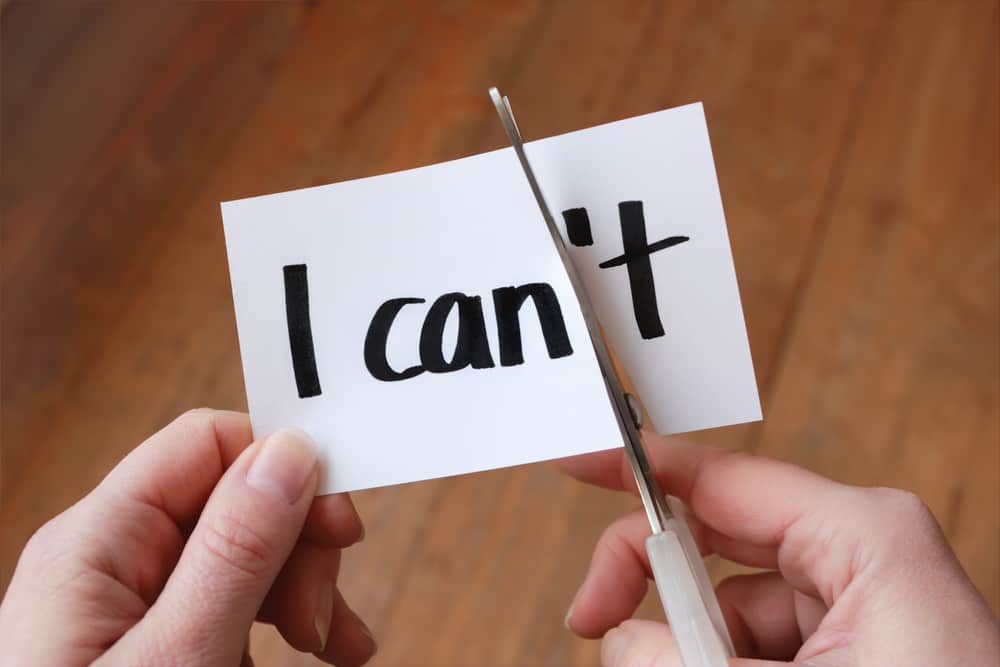How feel confident speaking French

Photo credit (and feature image): Shutterstock.com / Jacob Lund

Photo credit: Shutterstock.com / frantic00

Photo credit: Shutterstock.com / Marie Maerz
1. Most people you come into contact with only speak 1 language, so you’re already ahead of the game. The majority of French people do not speak English at a conversational level (especially outside of major cities and outside of business contexts), so you’re already one step ahead if you’re at least getting by in French. You’re doing the best you can and trying to converse because without your French ability (no matter how low you perceive that ability to be right now) with someone who doesn’t speak English, there wouldn’t be a conversation otherwise.
2. Other people can shake our confidence and it really sucks. Like when we can’t make ourselves understood or can’t get the point across fast enough. People can be short and even rude. This next line is so, so important. We are in control of what we say and do, and NOT how people react to us. If people react rudely, that’s all on them. Ya hear? People’s reactions of impatience or frustration or rudeness say way more about them than they do us. All we can do is present ourselves confidently, stand tall, and do our best.
3. Be kind to yourself and acknowledge that you’re doing the best you can in this moment. Are there people who speak better French? With more confidence? Yes, of course. But there are also people who are at a lower level struggling more than you are right now. Keep things in perspective and remember how far you’ve come. Absolutely nothing good comes out of beating yourself up and being hard on yourself about how much better you could or should be doing. Or what you should have done yesterday or last week or last year to improve your level of French. Trust me on that. All you have is right now and what you can do from this point onward.
4. Remember that tomorrow is a new day. So simple but so true. The power of a good night’s sleep is insane. The stress of today will melt away and you’l have a clean slate to start again tomorrow. Get some rest. Pick it up tomorrow. Forget about today. Give yourself a clean slate.

Photo credit: Shutterstock.com / David MG
5. If you consistently put in effort day in and day out, you will improve. The only way to go is up if you’re putting in the time. You will gain confidence and feel better about this whole speaking a foreign language thing as you improve, and I’m speaking from experience here. It’s the consistency part that counts, so don’t give up or slack off when you’re at your worst.
Maybe one day, all you can manage is a 20-minute podcast in French and the next day it’s studying grammar for an hour. Or conversation practice with your French teacher. Or 10 minutes of vocab review. You get the picture. Make sure you’re putting in the effort consistently to see progress. With progress, your confidence will improve because you’ll notice you’re saying, “Comment ?” less and people will ask you to repeat yourself less. You have to get through the hard stages to get on top of it. Practice does not make perfect. It makes progress and that’s what we’re shooting for.
In all honesty, it probably took me 2 years of living in France to get to a more confident level where I could make phone calls and approach people with confidence in my day-to-day life. Keep in mind, I work in English 95% of the time, speak English to my husband at home, and do not have a tight-knit group of French friends with whom to converse. Your progress timeline will vary.
6. Take time to focus on the things you’re good at for a confidence boost. If we constantly force ourselves to work on only the areas we’re the worst in, we’ll never feel good about what we’re doing. Yes, of course work on things you need to work on but make time to reinforce your skills in areas where you already excel. Are you good at making conversation? Are you a good listener? Strong at grammar exercises? Enjoy reading? Whatever area you feel you are the best in, spend time doing that whenever you can. It’ll give you a little internal boost.
7. OK, now if the accent thing is knocking your progress, listen up. It’s a fact that if you started learning French after age 14 or something like that, you will have a foreign accent of some sort. It’s inevitable and it’s totally cool. Really, like who cares. I can’t say this loudly enough. An accent is not a defect, nor is it indicative of your level of French. There are some people who speak near-flawless French but have quite a heavy accent.
On the flip side, some people are better at mimicking a French accent but their overall level of French isn’t very good. An accent, in and of itself, is not a reason to doubt yourself but I know it’s easy to do so. The one exception here is if your accent is getting in the way of comprehension. If people regularly ask you to repeat yourself or look confused when you talk, that’s a clue that it’s time to brush up on your pronunciation with a native speaker.
***
PIN IT:

Photo credit: Shutterstock.com / Sergey Novikov




Thanks for the article, Diane. Everything you’ve said is sound good sense – most especially, “Don’t be hard on yourself!” Actually, I think we are all better than we think we are in French, even at the most basic “Bonjour.” stage! (I need to tell myself that, too!!!)
When I came house-hunting in 2015, my French came back to me (I lived and worked as a nanny in Paris for a couple of years 40+ years ago), spoke with reasonable fluency in understandable, but pretty atrocious French, and I understood pretty well.
Fast forward from July 2015 to December 2017.
In between these dates came the terrorist attacks here in France. The Brexit vote happened. The pound plummeted. Overnight, I lost 33% of my capital because of the exchange rate.
The uk house sale fell through twice, just before the signing stage, and when it did sell, I ended up homeless for four months and had to stay with some wonderful friends for four month as I was busy hunting for a house that fitted my post-Brexit vote budget as opposed to the one that for which I had almost signed the Compromis (I was sooo thankful for the dilly-dallying of the estate agent, which is why I hadn’t yet signed it!) and which was now way above my budget
By the time I arrived, I was weary, mentally and physically drained (massive understatement). My furniture arrived three weeks later, and the first year was a nightmare of trying to get reliable workmen to do the essentials on the house (an older, lone Englishwoman is fair game to some people!), and do all the official red tape stuff. And to cap it all, from sheer fatigue, I lost my French!!!
For over a year, I had a fogged brain. But I have a house in a suburb of a small town, with French neighbours, I go to a French church, and had to cope with all the paperwork in French, so I had to get on with it. Everywhere I went, I was met with kindness and almost everyone I spoke with said, “I wish I could speak English as well as you speak French.” A few have even told me that I have a very pretty accent (very weird!)! And only one person in the three years I’ve been here has been impatient or rude.
I’ve found that simply making the attempt gains respect. When they go too fast, ,I say, with a smile, “Lentement, s’il vous plaît.” And they do.
Somewhere during year three, something clicked in my head, possibly because I’d spent almost three months recovering from an accident, and was forced to rest. Without being aware of it, my French had clicked back in.
I’m still atrocious. I still need to ask people to slow down. I still find it really hard to follow a conversation in a group of French people speaking at normal speed. But most of the time now, I’m choosing to walk with my head high, shoulders back, back straight, and a swing in my walk as I used to do (though it takes a very firm reminder to myself, sometimes!!!), and it’s sooo good. Body language speaks volumes, and so does a genuine smile when saying “Hello.” It sets the scene for the next bit.
You mentioned tiredness, lack of confidence, beating oneself up… Yup. Moi aussi!!! But the kindness of strangers and the patience of friends has been my greatest help as I’ve stammered and stuttered / stammer and stutter, my way through.
An app I’ve found a tremendous help, great fun and rather addictive, is Verb Squirt. The responses are timed and scored, and I’m mega-competitive against myself, not stopping till I get a good score on an exercise. And its free version is fine.
Sorry. I’ve waffled on…. but however we feel, making the effort to smile and walk tall, even when inside we are curling up shivering with lost confidence, can make all the difference to others’ reactions to us, and to our day…
Hi Barney, thank you for sharing your story! Will have a look at the app.
As you mentioned, body language counts for a lot and good on you for dealing w/all the French paperwork. It’s the stuff of nightmares!
And Brexit means I / all Brits in Europe are going to have to go through a whole lot more to secure our right to stay, to go on living in the place that we call home now. BUT that’s not the fault of the French officials who are having to / will have to deal with Brexit-weary, worried, anxious, stressed Brits, and I hold that thought clearly in my head, and remember how kind everyone has been to me… and I will do my best to walk tall, smile and say, “Please”,and “I’m sorry that I don’t quite understand…” and “Thank you for your help and your patience.”
I agree with everything you’ve written and especially the part about consistently putting in the effort. If you get discouraged and “take a week off” you will pay for it. Consistent effort, even if some days it’s just for a short period, helps keep everything fresh and connected in your brain.
I would also say that progress seems to come in bursts. I found that I would seem to plateau for a while, putting in the effort but not seeming to make any progress, and then one day it would seem like I had made a jump. So don’t get discouraged when you are on a plateau, it’s part of the normal learning process.
Hi Keith, yup, as with anything we want to become proficient at, the consistent effort is what pays off — French language skills included!
So true about the progress in bursts. Some hurdles are easier to get over and it feels so good once you’ve mastered something that you once struggled with and can look back at how things were vs now!
I like that you keep things real, confidence doesn’t come from someone telling me that I’m doing a good job, but rather from inside me, where I bake every mistake I make and I practice in my mind things I want to say until I feel capable to open my mouth and say them. What has helped me to get better at speaking more like natives is to pay attention to native’s conversations and then mimic that next time when I’m in similar situations. I found that people would recognize what I wanted to say much easier even though I may would have made some mispronunciations or small mistakes.
However, at the end of the day there is no substitution to actually speaking the language one is trying to master. The more one speaks, with mistakes and everything, the better gets at it. It takes a lot of courage, I know. But eventually you’ll get there. These days I don’t even blink when I need to call even the most difficult customer service, which is huge considering how terrified I was to do that few years ago.
Hi Niculina, thank you! Yes, what you’ve said about listening and mimicking natives is so true. That’s helped me as well. I often feel like I’m over-exaggerating the sound or expression but in reality, it’s usually just right.
Mistakes are another important step of the learning process. I’ve heard so many people say they’re scared of making mistakes so they don’t open their mouths as much and thus progress is stalled. There’s no way around the mistakes except through. Once we accept them as part of the process, I think our mentality shifts for the better.
Excellent advice, Diane! Thanks! Q
Thank you for reading!
Thanks Diane…your post is very timely for me at the moment, and has given me the encouragement to remember the confidence I need to just go with the flow…Louise
SO happy to hear that, Louise!
How to learn French:
–Sur l’oreiller, or on the pillow. Get a French lover, especially one who doesn’t speak your language. Not an option for everybody.
–For beginners, or those just on vacation: a French teacher in NY told us that the biggest group of verbs end in -er, which sounds like -ez. So when you speak to someone, you don’t need to think about conjugating–use “vous” (after all, as a tourist you’re unlikely to be on a first-name basis with people and need to use the formal form), and it sounds just like the infinitive. It removes a lot of stress. And even if you make a mistake, people will understand.
–A different French teacher had us memorize a sheet of phrases every week. This was for a class of mostly retired people wanting to brush up before vacation. People groaned, and she barked that having these phrases on the tip o your tongue was essential for being able to speak. It’s true. Maybe not a sheet of phrases every week, but feeling confident about a bunch of phrases means your brain can devote itself to formulating the rest of what you need to say.
Glad you enjoyed the post!
I have been in love with France for 60 years – since I was about 10! I’ve had the privilege of going to France 4 times and would so love to return but not physically able. I love your blog – it makes me feel so much closer to where my heart is. Thank you for including us in your life!